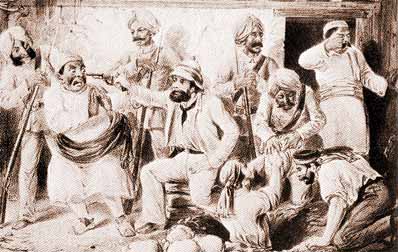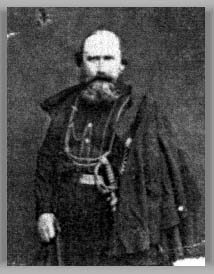

|
In the winter of 1857 and the first six months of 1858, the British slowly retook everything they had lost. With the relief of Lucknow, there were no large pockets of British lives to be saved and no serious possibility of British defeat. Massively reinforced from Britain, the armies which spread out over the north of India were vengeful and cruel, with a distinct taste for looting. They saw themselves as dispensors of divine justice and given the frenzy of murder that had accompanied the start of the mutiny felt their cruelties to be simply repayment in kind. As the myths of the mutiny grew, every dead British child became a slaughtered angel, every woman a violated innocent, every sepoy a black-faced, blood-crazed savage. There was little room for mercy in the hearts of the British troops and those, such as the Governor Lord Canning, who spoke of restraint were derided by their countrymen. Canning became known contemptuously as 'clemency Canning'. The Times newspaper called for the execution of every mutineer in India and in a debate at the Oxford Union, one speaker roused his audience by declaring,"When every gibbet is red with blood, when the ground in front of every cannon is strewn with rags and flesh and shattered bone, then talk of mercy. Then you may find some to listen." Lord Palmerston articulated the feelings of most Britons when he described the atrocities committed by the mutineers as acts "such as to be imagined and perpetrated only by demons sallying forth from the lowest depths of hell". In the early months of the British recovery, few sepoys were left alive after their positions were overrun. The British soldiers seemed to have made a collective decision not to take prisoners and most actions ended with a frenzied use of the bayonet. On the line of march whole villages were sometimes hanged for some real or imagined sympathy for the mutineers. Looting was endemic and neither the sanctity of holy places nor the rank of Indian aristocrats could prevent the wholesale theft of their possessions. Many a British family saw its fortune made during the pacification of northern India. Later, when prisoners started to be taken and trials held, those convicted of mutiny were lashed to the muzzles of cannon and had a roundshot fired through their body. It was a particularly cruel punishment with a religious dimension in that by blowing the body to pieces the victim lost all hope of entering paradise. For more than a year the people of northern India trembled with fear as the British sated their thirst for revenge. The Indians called it 'the Devil's Wind'. And finally, in one of those ironical twists that the forces of history seem to revel in, the prophecy that had said, "a hundred years after the Battle of Plassey the rule of John Company will end" actually came true. When the British desire for punishment and revenge was spent, they started to think about how future mutinies could be prevented. They realised that it was inappropriate for a land the size of India to be governed by a private company and instead introduced direct rule through the India Office, a British department of state. A hundred years after Plassey the rule of the Honourable East India Company finally did come to an end. |
